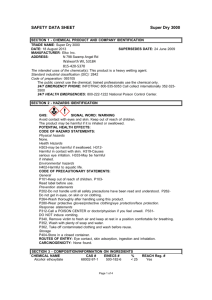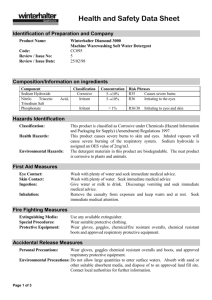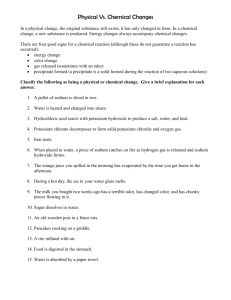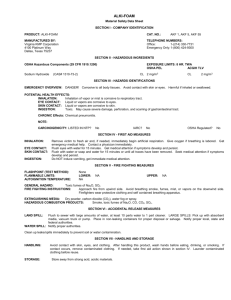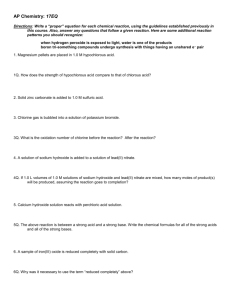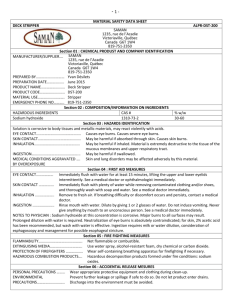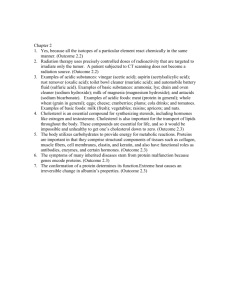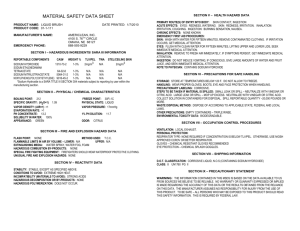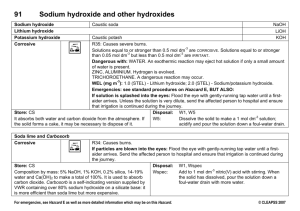Detergent 3000
advertisement
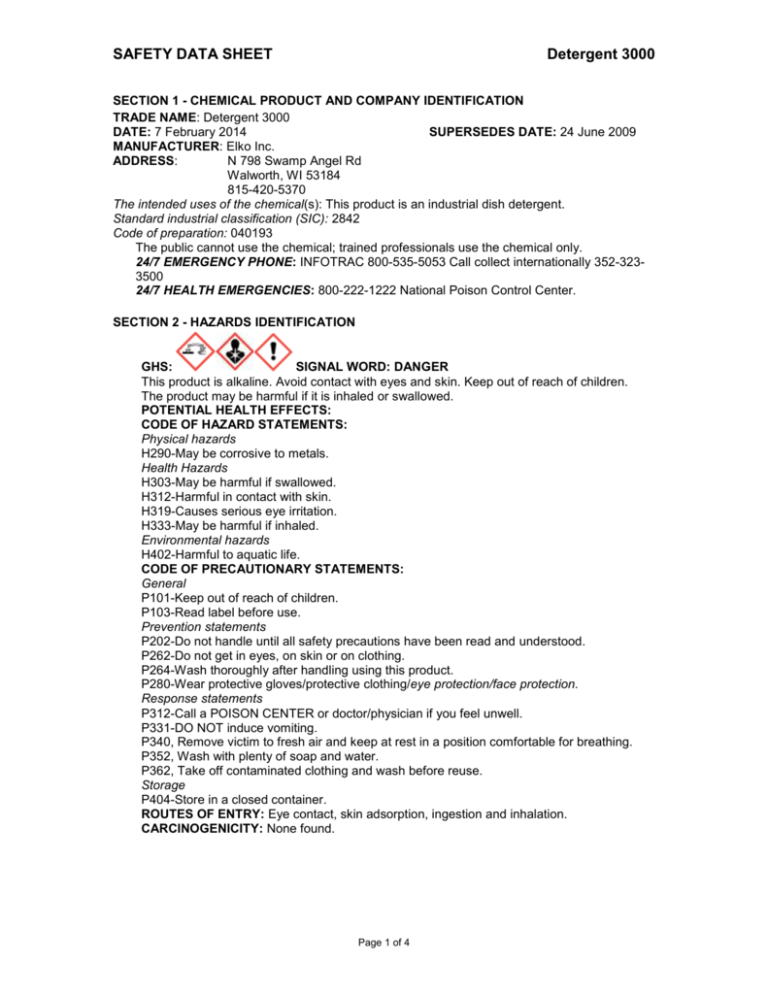
SAFETY DATA SHEET Detergent 3000 SECTION 1 - CHEMICAL PRODUCT AND COMPANY IDENTIFICATION TRADE NAME: Detergent 3000 DATE: 7 February 2014 SUPERSEDES DATE: 24 June 2009 MANUFACTURER: Elko Inc. ADDRESS: N 798 Swamp Angel Rd Walworth, WI 53184 815-420-5370 The intended uses of the chemical(s): This product is an industrial dish detergent. Standard industrial classification (SIC): 2842 Code of preparation: 040193 The public cannot use the chemical; trained professionals use the chemical only. 24/7 EMERGENCY PHONE: INFOTRAC 800-535-5053 Call collect internationally 352-3233500 24/7 HEALTH EMERGENCIES: 800-222-1222 National Poison Control Center. SECTION 2 - HAZARDS IDENTIFICATION GHS: SIGNAL WORD: DANGER This product is alkaline. Avoid contact with eyes and skin. Keep out of reach of children. The product may be harmful if it is inhaled or swallowed. POTENTIAL HEALTH EFFECTS: CODE OF HAZARD STATEMENTS: Physical hazards H290-May be corrosive to metals. Health Hazards H303-May be harmful if swallowed. H312-Harmful in contact with skin. H319-Causes serious eye irritation. H333-May be harmful if inhaled. Environmental hazards H402-Harmful to aquatic life. CODE OF PRECAUTIONARY STATEMENTS: General P101-Keep out of reach of children. P103-Read label before use. Prevention statements P202-Do not handle until all safety precautions have been read and understood. P262-Do not get in eyes, on skin or on clothing. P264-Wash thoroughly after handling using this product. P280-Wear protective gloves/protective clothing/eye protection/face protection. Response statements P312-Call a POISON CENTER or doctor/physician if you feel unwell. P331-DO NOT induce vomiting. P340, Remove victim to fresh air and keep at rest in a position comfortable for breathing. P352, Wash with plenty of soap and water. P362, Take off contaminated clothing and wash before reuse. Storage P404-Store in a closed container. ROUTES OF ENTRY: Eye contact, skin adsorption, ingestion and inhalation. CARCINOGENICITY: None found. Page 1 of 4 SAFETY DATA SHEET Detergent 3000 SECTION 3 - COMPOSITION/INFORMATION ON INGREDIENTS CHEMICAL NAME CAS # EINECS # % REACH Reg. # Sodium hydroxide 1310-73-2 215-185-2 > 15 Yes Alcosperse 9003-04-7 NA > 6 No Sodium silicate 1344-09-8 215-687-4 > 3 Yes Water 7732-18-5 231-791-2 Balance No Note red dye and sassofrass are added less than 0.1% SECTION 4 - FIRST AID MEASURES INHALATION: Move to fresh air free from risk of further exposure. If person not breathing call 91-1, then apply rescue breathing. Seek medical attention as soon as possible. EYE CONTACT: Flush with clean, lukewarm water raising upper and lower eyelids at low pressure for 15 minutes. Remove contact lenses, if present, after the first five minutes and continue to rinse the eyes. Seek medical attention if no relief. SKIN CONTACT: Rinse area with clean water for 15-20 minutes. Call poison control center or doctor for treatment advice. INGESTION: Call a poison control center or doctor immediately for treatment advice.DO NOT INDUCE VOMITING. Lower the head when person is vomiting to minimize entry into throat and lungs. SECTION 5 - FIREFIGHTING MEASURES FLASHPOINT AND METHOD: ND FLAMMABLE LIMITS: LEL = NE% UEL = NE% EXTINGUISHING METHOD: Use dry chemicals, carbon dioxide and foam. FIRE OR EXPLOSION HAZARDS: This material under complete combustion will form oxides of carbon. SPECIAL FIREFIGHTING PROCEDURES: Keep upwind of fire. Full emergency equipment with self-contained breathing apparatus and full protective clothing to be worn by firefighters. SECTION 6 - ACCIDENTAL RELEASE MEASURES SPILL OR LEAK PROCEDURES: Wear PPE product is alkaline. Isolate the area and prevent material from getting into waterways. Absorb liquid with vermiculite, sand or other inert absorbent and place the collected material in a closed container. Finish cleaning the area with small amounts of soap and water on the spill area. SECTION 7 - HANDLING AND STORAGE STORAGE TEMPERATURE: Keep containers tightly and keep in cool dry area. SPECIAL SENSITIVITY: Avoid contact with skin and eyes wear PPE in section 8. HANDLING AND STORAGE PRECAUTIONS: Use normal safety procedures and good personal hygiene. Wash thoroughly after use and before eating, drinking, chewing gum or using tobacco. SECTION 8 - EXPOSURE CONTROLS/PERSONAL PROTECTION EYE PROTECTION: Use safety glasses or goggles (EN 166), there is potential for mist exposure to cause severe injury to the eyes. SKIN PROTECTION: Wear chemical resistant glove (Nitrile.) Wear long sleeve shirts, long pants, shoes, and socks to handle. RESPIRATORY PROTECTION: Wear respirator if the airborne conditions result in an aerosol forming Combination air purifying respirator AXBEK or EN 14387). OCCUPATIONAL EXPOSURE LIMITS: OSHA PEL TWA: Sodium hydroxide, 2 ppm ENGINEERING CONTROLS: Provide adequate ventilation when product is used. Eyewash and shower should be provided in mixing and loading areas. Page 2 of 4 SAFETY DATA SHEET Detergent 3000 SECTION 9 - PHYSICAL AND CHEMICAL PROPERTIES Colour: Red liquid Odour: pH: > 14 Specific gravity: Solubility (water): Soluble Pleasant odour >1 SECTION 10 - REACTIVITY STABILITY: This product is stable material under normal conditions of storage and handling. HAZARDOUS POLYMERIZATION: It will not polymerize. INCOMPATIBLES: Avoid strong oxidizing agents and acids. Avoid Aluminum, Copper, Copper alloys, Tin and Zinc. DECOMPOSITION PRODUCTS: Product will burn and the products of complete combustion are oxides of carbon, phosphorus and ammonia. SECTION 11 - TOXICOLOGICAL/ECOLOGICAL INFORMATION The significant routes of exposure are eyes, skin, ingestion and inhalation. Product is not a carcinogen. SECTION 12 - DISPOSAL CONSIDERATIONS WASTE DISPOSAL METHOD: Wear PPE as outlined in Section VIII. The product contains sodium hydroxide a corrosive material. Wear proper PPE. Dispose according to the regulations of local, state and Federal regulatory agencies. SECTION 13 - TRANSPORTATION INFORMATION US DOT (ground) SHIPPING NAME: UN3266, Corrosive liquid, Basic, Inorganic, N.O.S., (Sodium hydroxide), 8, III IATA (air) SHIPPING NAME: CARGO AIRCRAFT ONLY UN3266, Corrosive liquid, Basic, Inorganic, N.O.S., (Sodium hydroxide), 8, III Use packing instruction P001. IMO (water) SHIPPING NAME: UN3266, Corrosive liquid, Basic, Inorganic, N.O.S., (Sodium hydroxide), 8, III Use packing instruction 820. Maximum capacity id 60 L (15.85 gals). SECTION 14 - REGULATORY INFORMATION OSHA STATUS: Corrosive. TSCA STATUS: None. CERCLA REPORTABLE QUANTITY: Sodium hydroxide;1000 lbs. (454 kgs.). CALIFORNIA PROPOSITION 65: None. RCRA STATUS: None. SARA 311/312 HAZARD NOTIFICATION/REPORTING IMMEDIATE Y FIRE N SUDDEN RELEASE OF PRESSURE DELAYED N REACTIVE N_ SARA TITLE III: SECTION 302 EXTREMELY HAZARDOUS: None. SECTION 311/312 HAZARD CATEGORIES: None. SECTION 313 TOXIC CHEMICALS: None. RIGHT TO KNOW: All ingredients listed in FL, MA, NJ and PA. EUROPEAN COMMUNITY: WHMIS: Page 3 of 4 Class E N SAFETY DATA SHEET Detergent 3000 SECTION 15 – OTHER INFORMATION/APPROVALS National Fire Protection Association (NFPA) Hazardous Materials Identification System (HMIS) NFPA HMIS 0 Least 2 Health 1 Slight 0 Flammability 2 Moderate 2 Instability 3 High 4 Severe 2 0 2 G Health Flammability Reactivity PPE SECTION 16 – ABBREVIATIONS /DISCLAIMER REASON FOR ISSUE: This new MSDS complies with GHS regulations (Section 2 pictograms) and REACH compliance (Section 3). APPROVAL DATE: 28 February 2014 PREPARED BY: Dennis Belau REVIEWED BY Chris Eck DBelau@comcast.net ABBREVIATIONS: CAS # Chemical Abstract Service Number ºC Prop. TLV STEL OSHA NFPA Celsius temperature scale Proprietary Threshold Limit Value Short-term Exposure Limit Occupational Safety & Health National Fire Protection Agency EINECS European Inventory of existing Commercial Chemical Sales ºF Fahrenheit temperature scale PE Personal Protective Equipment TWA Time Weighted Average PEL Permissible Exposure Limit NIOSH National Institute of Safety & Health WHMIS Workplace Hazardous Materials Information System IARC Int. Agency for Research on Cancer TSCA Toxic Substance Control Act LC50 Lethal Inhalation Concentration CAS Chemical Abstract Service Number UEL Upper explosive limit ND Not determined NA Not Applicable > Greater Than or Equal To CI China ECL Korean Existing Chemicals List Japanese Existing and New Chemical List MAC Netherlands MITI Japan SWISS Giftliste 1 USA United States NTP National Toxicology Program RCRA Resource Conservation Recovery ACT EC50 Effective Dose LD50 Lethal Dose LEL Lower explosive limit NDA No Data Available NE None established < Less Than or Equal To CNS Central Nervous System DSL Canada EEC European Economic Commission ENCS EU European Union MAK Germany PICCS Philippines UK United Kingdom VOC Volatile organic content ACGIH American Conference of Government Industrial Hygienists SARA Superfund Amendments and Reauthorization Act AICS Australian Inventory of Chemical Substances IARC International Agency for Research on Cancer Taiwan List of Toxic Chemical Substances regulated under Taiwan Toxic Chemical Substances Control Act of 1086 Disclaimer: This information is furnished without warranty expressed or implied except that it is accurate to the best knowledge of Elko Inc. (Company). The data and information on the Safety Data Sheet relates only to the specific material designated herein. (Company) assumes no legal responsibility for use or reliance upon the data. Page 4 of 4
